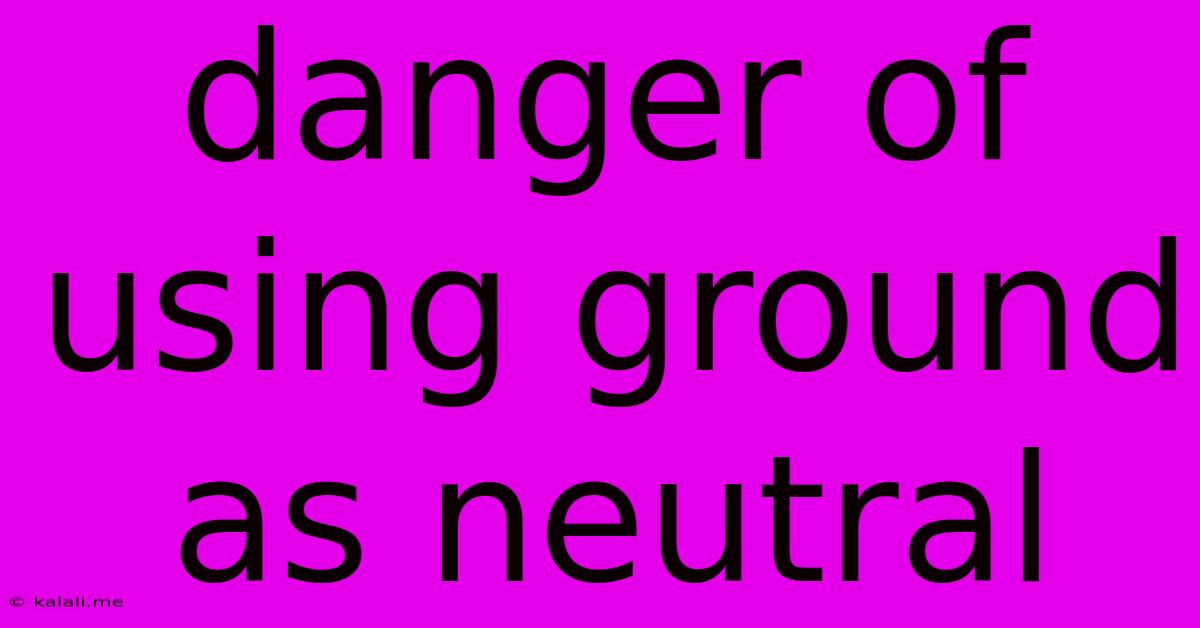Danger Of Using Ground As Neutral
Kalali
Jun 06, 2025 · 3 min read

Table of Contents
The Dangers of Using Ground as Neutral: A Comprehensive Guide
Meta Description: Using ground as a neutral conductor is incredibly dangerous and can lead to severe electrical shocks, equipment damage, and even fires. This article explores the risks and explains why it's crucial to maintain proper grounding and neutral separation in electrical systems.
Grounding and neutral are two distinct parts of an electrical system, often confused but with critically different functions. While they might seem interchangeable, using ground as a neutral is a serious safety hazard with potentially devastating consequences. This article delves into the inherent dangers of this practice, explaining why it should be strictly avoided.
What's the Difference Between Ground and Neutral?
Before understanding the dangers, let's clarify the roles of ground and neutral:
-
Neutral: This wire completes the electrical circuit, carrying the current back to the source (transformer or generator). It's typically connected to the earth at the transformer, but this connection is controlled and intended.
-
Ground: This wire provides a path to earth for fault currents, protecting against electrical shocks and preventing equipment damage. It's a safety feature, designed to divert stray electricity away from humans and appliances.
The Dangers of Combining Ground and Neutral
Using ground as a neutral creates several significant risks:
-
Electric Shock Hazard: If the neutral wire breaks or becomes disconnected, the voltage on the hot wire can appear on the chassis of appliances and other metal parts. Since the ground is now serving as the neutral, touching these parts could result in a potentially fatal electric shock. This is especially dangerous in systems without proper Ground Fault Circuit Interrupters (GFCIs).
-
Equipment Damage: The improper voltage distribution can lead to malfunctioning appliances, damaged electronic components, and even complete equipment failure. This can result in significant financial losses and disruption.
-
Fire Hazard: A high current flowing through the ground wire (acting as a neutral) can generate excessive heat, potentially igniting flammable materials and causing electrical fires. This is exacerbated by the increased resistance in the ground path compared to a dedicated neutral conductor.
-
Incorrect Circuit Operation: The system's protective devices, such as circuit breakers and fuses, may not function correctly when ground is used as neutral. This can lead to continued dangerous current flow even when a fault occurs, increasing the risk of fire and electric shock.
-
Voltage Imbalance: Using ground as neutral can disrupt the voltage balance in the system, leading to unpredictable behavior and increasing the likelihood of equipment damage or failure.
Why This Practice is Common (and Why It's Wrong)
In some cases, particularly in older or poorly maintained systems, the ground and neutral wires might be bonded together improperly or mistakenly. This often stems from a misunderstanding of the system's electrical principles, shortcuts during installation, or faulty wiring. Regardless of the cause, the practice is inherently dangerous and should never be intentional.
Prevention and Safety Measures
-
Proper Installation: Ensure all electrical work is carried out by a qualified electrician who understands the critical difference between ground and neutral.
-
Regular Inspections: Periodic inspections of your electrical system can help identify potential problems, including improper ground-neutral connections, before they become hazards.
-
Use of GFCIs: Ground Fault Circuit Interrupters (GFCIs) are crucial safety devices that can detect ground faults and quickly shut off power, reducing the risk of electric shock.
-
Understanding Electrical Codes: Familiarize yourself with local electrical codes and regulations to ensure your system meets safety standards.
Using ground as a neutral is a significant electrical hazard. It compromises safety, increases the risk of equipment damage, and poses a considerable fire risk. Prioritizing proper grounding and neutral separation is paramount to maintaining a safe and functional electrical system. Always consult a qualified electrician for any electrical work or concerns.
Latest Posts
Latest Posts
-
How To Fix A Fence Post That Is Leaning
Jun 06, 2025
-
Where Are Arc Fault Circuit Breakers Required
Jun 06, 2025
-
Can You Stack Any Washer And Dryer
Jun 06, 2025
-
What Is A Substitute For Cornstarch
Jun 06, 2025
-
How To Wire A Three Phase Motor
Jun 06, 2025
Related Post
Thank you for visiting our website which covers about Danger Of Using Ground As Neutral . We hope the information provided has been useful to you. Feel free to contact us if you have any questions or need further assistance. See you next time and don't miss to bookmark.